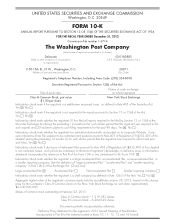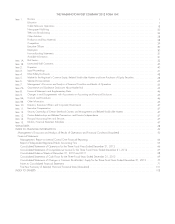Washington Post 2012 Annual Report Download - page 19
Download and view the complete annual report
Please find page 19 of the 2012 Washington Post annual report below. You can navigate through the pages in the report by either clicking on the pages listed below, or by using the keyword search tool below to find specific information within the annual report.year. For the 2012 fiscal year, Kaplan expects KHE to have a composite score of 2.25, based on its own assessment
using DOE methodology. However, the DOE will make its determination once it receives and reviews Kaplan’s audited
financial statements for the 2012 fiscal year.
Administrative Capability. The Higher Education Act, as reauthorized, directs the DOE to assess the administrative
capability of each institution to participate in Title IV programs. The failure of an institution to satisfy any of the criteria used to
assess administrative capability may cause the DOE to determine that the institution lacks administrative capability, and,
therefore, the DOE may subject the institution to additional scrutiny, deny eligibility for Title IV programs or impose other
sanctions. To meet the administrative capability standards, an institution must, among other things, fulfill the following:
• Comply with all applicable Title IV program requirements;
• Have an adequate number of qualified personnel to administer Title IV programs;
• Have acceptable standards for measuring the satisfactory academic progress of its students;
• Have procedures in place for awarding, disbursing and safeguarding Title IV funds and for maintaining required
records;
• Administer Title IV programs with adequate checks and balances in its system of internal control over financial
reporting;
• Not be, and not have any principal or affiliate who is, debarred or suspended from U.S. Federal contracting or
engaging in activity that is cause for debarment or suspension;
• Provide financial aid counseling to its students;
• Refer to the DOE’s Office of the Inspector General any credible information indicating that any student, parent,
employee, third-party servicer or other agent of the institution has engaged in any fraud or other illegal conduct
involving Title IV programs;
• Submit in a timely way all required reports and financial statements; and
• Not otherwise appear to lack administrative capability.
Although Kaplan endeavors to comply with the administrative capability requirements, Kaplan cannot guarantee that it will
continue to comply with the administrative capability requirements or that its interpretation or application of the relevant
rules will be upheld by the DOE or other agencies, or upon judicial review.
State Authorization. Kaplan’s institutions are subject to state-level regulation and oversight by state licensing agencies,
whose approval is necessary to allow an institution to operate and grant degrees or diplomas in the state. State laws
may establish standards for instruction, qualifications of faculty, location and nature of facilities, financial policies and
responsibility and other operational matters. Institutions that participate in Title IV programs must be legally authorized to
operate in the state in which the institution is physically located or is otherwise subject to state authorization requirements.
Some states have sought to assert jurisdiction over online educational institutions that offer education services to residents in the
state or to institutions that advertise or recruit in the state, notwithstanding the lack of a physical location in the state. State
regulatory requirements for online education vary among the states, are not well developed in many states, are imprecise or
unclear in some states and are subject to change. If KHE is found not to be in compliance with an applicable state regulation
and a state seeks to restrict one or more of KHE’s business activities within its boundaries, KHE may not be able to recruit or
enroll students in that state and may have to cease providing services and advertising in that state.
DOE regulations became effective on July 1, 2011, and expanded the requirements for an institution to be considered
legally authorized in the state in which it is physically located for Title IV purposes. In some cases, the regulations require
states to revise their current requirements and/or to license schools in order for institutions to be deemed legally
authorized in those states and, in turn, to participate in the Title IV programs. If the states do not amend their requirements
in compliance with these regulations or if KHE institutions do not receive state approvals where necessary, then the
institutions could be deemed to lack the state authorization necessary to participate in the Title IV programs. Due to an
exemption, Kaplan University’s home state of Iowa does not require Kaplan University to be registered in Iowa. However,
to comply with the law, Kaplan University was granted affirmative registration in Iowa. All of Kaplan University’s and
KHEC’s campuses meet the requirements to be considered legally authorized to provide the programs they offer in the
states in which the campuses are located.
In addition, the DOE regulations that took effect on July 1, 2011, also required institutions offering postsecondary
education to students through distance education in a state in which the institution is not physically located, or in which it
is otherwise subject to state jurisdiction as determined by the state, to meet any applicable state requirements for it to be
2012 FORM 10-K 7
























